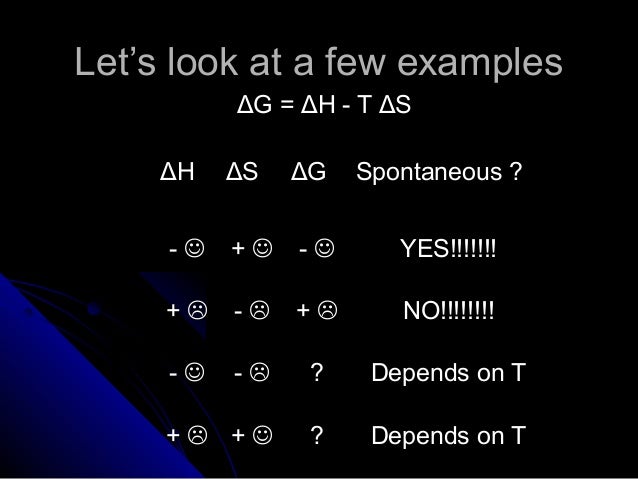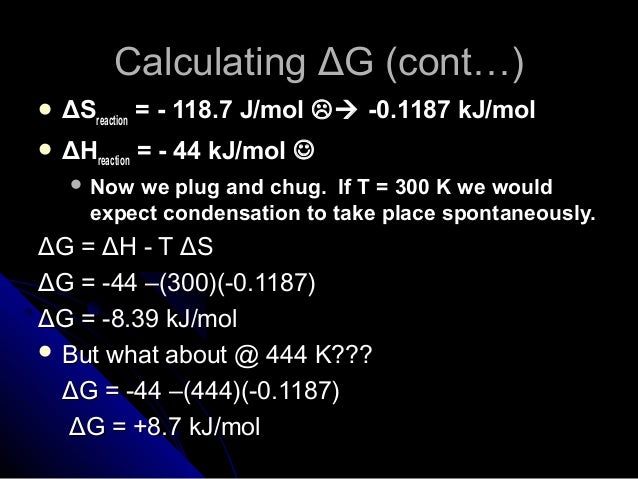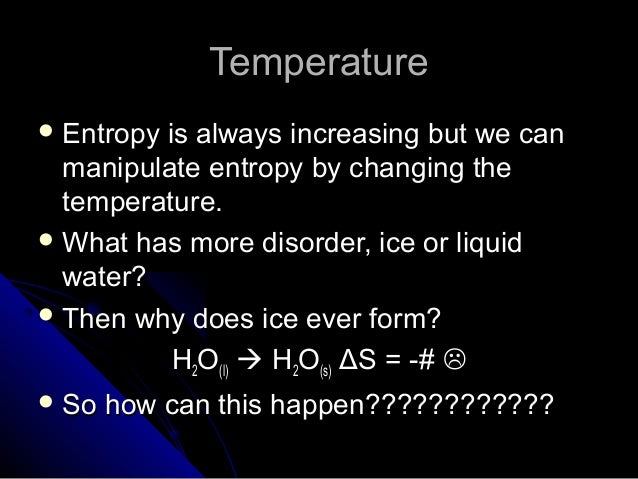

Heat taken by no system while there is no phase change: q=mcDT (mcat!) You need to learn definitions for certain questions Now some demystifications from previous posts: This equation implies that just because a system is exoTHERMIC, does not mean that it will be spontaneous. DG has to be negative for a reaction to be spontaneous. The famous MCAT equation is DG = DH - TDS.
ENTROPY VS ENTHALPY FREE
There is a concept called Gibb's Free Energy, (DG) it supposed to mean the amount of useful work that can be obtained from a system at constant temperature and constant pressure. But there are related questions that MCAT wants you to know about. Seriously, I just answered all your questions. Know that a reaction with negative DH is exothermic and gives off heat, while positive DH is endothermic and absorbs heat. You should multiply everything by their stoichiometric coefficients, that means that you usually need a balanced equation. If you have an enthalpy problem, nine out of ten times, all you will have to do is take the change in enthalpy of the products and substract from it the change in enthalpy of the reactants. For experimental scientists, it means that it is worth going through the headache of confusing generations of science students.

The advatage is that the CHANGE in enthalpy is easily measurable. The only reason that this ENTHALPY thing was invented is because the change in enthalpy turns out to be equal to the energy of a system when pressure is constant. Now that we have talked somehow about entropy, let's talk about enthalpy.Įnthalpy is just a mathematical expression defined as H = U + PV. Yes, I knew that all you asked me for was enthalpy and entropy, but you need to understand the above concepts before going futher. However, it does not mean that all molecules would become static (no type of motion whatsoever) at 0 K. At the limit of that temperature, entropy of all system is zero. The third law of thermodynamic makes the bold assumption that we cannot reach absolute zero.

You can think of entropy as a measure of disorder, but it is defined mathematically as dS = dq/T, where T is the absolute temperature. What it says is that all processes in this world that happen spontaneously will result an increase in entropy, or at the very least, the entropy should remain the same. Heat is still not defined, we think that we know what it is, but we don't.Ģ. You may know in physics that work is w= F*d = P*V. The only way that the energy of that system can be decreased is by heat or work. So if you got a system that has a certain amount of internal energy, you won't just lose this energy since it is conserved. The first law also says that in most situations, energy (U) comes in the form of either work (w) or heat (q). If someone proves this wrong, scientists are out of business. You should know that the First Law is that Energy is conserved. Thermodynamic questions are common in the MCAT because they really affect all science. (an insulator)Ĭlosed systems can exchange heat but not matter.ġ. Isolated systems cannot exchange matter or energy with their environments. Systems are part of the universe that we are interested in. The following should serve you as an introduction. There are actually just a few things that you will need to know for the MCAT, they are all covered in your local Freshman Chem textbook, very uninterestingly, that is. I apologize on behalf of my really smart peers for throwing on you details usually taken into consideration only in Pchem and Thermo classes.


 0 kommentar(er)
0 kommentar(er)
